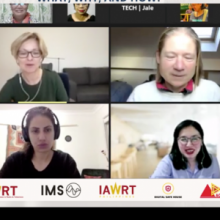Gender-sensitive Approach on Journalists’ Safety: What, Why and How?
This webinar was held as part of the Digital Safe House for Filipino Women Journalists project
IAWRT held a webinar on “Gender-sensitive Approach on Journalists’ Safety; What, Why and How?” on December 8, 2021 as part of the build-up to the launch of the Digital Safe House Project for Women Journalists.
Women journalists face specific threats to their safety and professional development and there is growing international consensus that a gender-sensitive approach to promoting the safety of journalists around the world is essential. But what exactly do we mean by gender-sensitive? What evidence do we have that such an approach to journalists’ safety is warranted? Who is supposed to ensure gender-sensitive approach is integrated throughout the safety work? And finally, how will we know if this has been achieved?
The webinar was moderated by Dr. Greta Gober, Vice President of IAWRT International.
IAWRT Philippines Vice President Margarita Valle delivered the opening remarks. She discussed the situation of women journalists during the pandemic and the importance of knowledge on journalists safety to continue the various responsibilities of media practitioners including bringing information to the people.
IAWRT Philippines Board Member Janess Ellao, the first speaker, shared a study she co-authored, conducted and presented in 2020, “Dealing with sexual harassment: Are women journalists silenced at work?” In the first part of her discussion, she explained that there are currently limitations in studies and literature about various attacks on women journalists including sexual harassment and other forms of violence at work. Most victims choose to be silent when it comes to these violations.
The main results of the study showed a hazing culture among women journalists who tend to be harassed when they are still new in the industry, both by colleagues and other personalities they encounter in the field. She shared the conclusion of the study, stressing cases that were not reported because the victims and violators have a belief that such attitudes on women are normal. There is also a lack of support from media companies in addressing such issues both in legal and professional aspects. Ellao ended with sharing how journalists are countering these attacks themselves.
The second speaker, Dr. Ayesha Jehangir, introduced her paper and research which started in 2015 and was published in 2020, and featured in a UNESCO research on gender-based harassment. She gave a background on the research which was a study on the threats and attacks on Pakistani women journalists. Dr. Jehangir enumerated the different manifestations of these abuses from trolling to catcalling, up to rape and even murder. She also noted that online abuses are also becoming prevalent both in social media and through electronic mail. These abuses had different impacts on women journalists such as mental health issues, censorship, and even change of careers. She identified the facilitators of this situation as ‘medium, misogyny, and management.’
Dr. Jehangir also stated that there are laws that are supposed to arrest these abuses but are not being implemented well in Pakistan. Civil society organizations turned out to be more helpful in responding to harassment cases. Before ending the presentation, she also shared some campaign efforts conducted by women journalists to confront their situation.
Dr. Jehangir is a journalist and researcher for University of Technology Sydney, Australia, and author of a qualitative study in Pakistan, “Cost of Doing their Job: Online Harassment of Women Journalists.”
The last speaker, Dr. Diana Maynard, talked about data analysis of online harassment encountered by the Nobel Peace Prize laureate Maria Ressa, which is a part of a bigger research on online violence against women journalists.
Dr. Maynard explained that the analysis of this study will help journalists to be able to understand the different aspects of online abuse. She then enumerated the basic methodology they used for computational analysis on the case of Maria Ressa. She noted that there is actually twice as much abuse as they detected in the research.
Dr. Maynard challenged the audience in asserting the fight for media freedom and ensuring the safety of women journalists.
Dr. Maynard is Senior Researcher for the Department of Computer Science, Sheffield University and Co-researcher in the UNESCO commissioned Global Study on Effective Measure to Tackle Online Harassment of Women Journalists and author of “The Chilling: Global Trends in Online Violence Against Women Journalists.”
The webinar was attended by members of IAWRT from different chapters, other women journalists, and communication students from the Philippines.
IAWRT in partnership with International Media Supportis launching the Digital Safe House and Collaboration Platform for Women Journalists in the Philippines on December 10. This is a pilot project and the objective in the future is to build similar Digital Safe Houses in other parts of the world, where IAWRT has chapters, where independent reporting and media freedom are stifled, and where it is becoming increasingly difficult to be a woman journalist.








